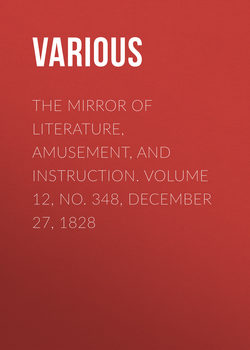Читать книгу The Mirror of Literature, Amusement, and Instruction. Volume 12, No. 348, December 27, 1828 - Various - Страница 5
Barber's Barn, Hackney
ON IDLENESS
Оглавление(For the Mirror.)
It has been somewhere asserted, that "no one is idle who can do any thing. It is conscious inability, or the sense of repeated failures, that prevents us from undertaking, or deters us from the prosecution of any work." In answer to this it may be said, that men of very great natural genius are in general exempt from a love of idleness, because, being pushed forward, as it were, and excited to action by that vis vivida, which is continually stirring within them, the first effort, the original impetus, proceeds not altogether from their own voluntary exertion, and because the pleasure which they, above all others, experience in the exercise of their faculties, is an ample compensation for the labour which that exercise requires. Accordingly, we find that the best writers of every age have generally, though not always, been the most voluminous. Not to mention a host of ancients, I might instance many of our own country as illustrious examples of this assertion, and no example more illustrious than that of the immortal Shakspeare. In our times the author of "Waverley," whose productions, in different branches of literature, would almost of themselves fill a library, continues to pour forth volume after volume from his inexhaustible stores. Mr. Southey, too, the poet, the historian, the biographer, and I know not what besides, is remarkable for his literary industry; and last, not least, the noble bard, the glory and the regret of every one who has a soul to feel those "thoughts that breathe and words that burn," the mighty poet himself, notwithstanding the shortness of his life, is distinguished by the number, as well as by the beauty and sublimity of his works. Besides these and other male writers, the best of our female authors, the boast and delight of the present age, and who have been compared to "so many modern Muses"—Miss Landon, Mrs. Hemans, Miss Edgeworth, Miss Mitford, &c.—have they not already supplied us largely with the means of entertainment and instruction, and have we not reason to expect still greater supplies from the same sources?
But although it may be easily allowed that men of very great natural genius are for the most part exempt from a love of idleness, it ought also to be acknowledged that there are others to whom, indeed, nature has not been equally bountiful, but who possess a certain degree of talent which perseverance and study (if to study they would apply themselves) might gradually advance, and at last carry to excellence.
With the exception of a few master spirits of every age and nation, genius is more equally distributed among mankind than many suppose. Hear what Quintilian says on the subject; his observations are these:—"It is a groundless complaint, that very few are endowed with quick apprehension, and that most persons lose the fruits of all their application and study through a natural slowness of understanding. The case is the very reverse, because we find mankind in general to be quick in apprehension, and susceptible of instruction, this being the characteristic of the human race; and as birds have from nature a propensity to fly, horses to run, and wild beasts to be savage, so is activity and vigour of mind peculiar to man; and hence his mind is supposed to be of divine original. But men are no more born with minds naturally dull and indocile, than with bodies of monstrous shapes, and these are very rare."
From what has been premised, this conclusion may be drawn—that it is not "conscious inability" alone, but often a love of leisure, which prevents us from undertaking any work. Many, to whom nature had given a certain degree of genius, have lived without sufficiently exercising that genius, and have, therefore, bequeathed no fruits of it to posterity at their death.
